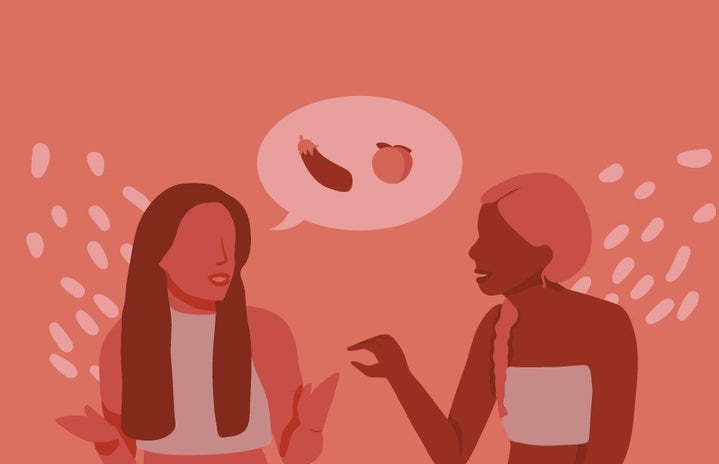Dr. Lexx Brown-James was only 7 years old when her twin brother accidentally caught their parents having sex in their kitchen. After that moment of confusion, her mother gathered the kids, pulled out a biology book and explained what sex is.
This is the first instance of sex education Brown-James, now 34, recalls. Sitting on the couch with her own kids jumping up to see who’s on the video call, she told that story with no hush or hesitation. She joked about how it’s good that her parents were still having fun at that age.
“Having my period earlier, having my twin who was also going through puberty at 9, I got a lot of sex ed pretty early,” she said in a video interview.
Brown-James is a licensed marriage and family therapist and a certified sex educator originally from College Park, Georgia. She practices therapy, teaches classes and holds events discussing relationships, race and sexuality. She is also a bestselling author, writes reviews and has been featured on several podcasts, including on NPR.
Brown-James has made a busy and impressive career out of sex and relationships.
“I have been trained to look at people in systems, so I don’t see people as just individuals. Nobody exists in a vacuum,” she said about her therapy work, “My job typically is to look at the relationships between people, and not just the person that’s present, so I often think of who else is present in this person’s life, and how else is this behavior working to their detriment or working for their benefit,” she said.
Brown-James’ clients are usually queer Black men and women who are looking for validation in their relationships and situations. She practices emotion-focused sessions that highlight the link between feelings and behavior. Context is especially important.

Her favorite experiences are when she has a client experiencing “attachment injury,” when a client faces a betrayal from a partner and gets a letter or message months later about how she helped the relationship in a time of need.
“I never work in active affairs,” she said. Although she has worked in relationships facing the most difficult situations, this is her one boundary.
Brown-James’ typical day during the pandemic looks a bit different, but the important things are the same. Her practice is temporarily online. She lives with her partner and two children, ages 2 and 4 in Philadelphia.
“We met online. She reached out to me,” her partner Kwasi Asare, 43, said about Brown-James in a video interview. “With her background in therapy and such, not to say that she psychoanalyzes me, we have pretty good discussions. Our communication is very open and frank.”
Her career plan began much differently. It always seemed that Brown-James was destined for the sciences, even attending a science magnet high school. She started college early at Georgia State University but transferred to Emory University majoring in physics pre-med.
After hearing a story about a transgender woman trying to get transition surgery, she decided she wanted to be a doctor so she could provide those surgeries. However, that would have required her to go into plastic surgery, and she realized that wasn’t what she wanted.
“Plastic surgery tells people like me, a Black fat person, that we are not attractive,” she explained.
But Brown-James still wanted to help people like the woman in the story. So she decided she instead “wanted to fix people from inside out.”
She went to graduate school and earned two master’s degrees in marriage and family therapy and in human sexuality to fulfill her goal of helping marginalized people. She also went on to earn her doctorate in human sexuality.
Camille Kashaka, 35, described her relationship with Brown-James as “ultimate homies.” They met in third grade and have been close friends ever since.
“We were weirdos growing up,” Kashaka said in a video interview. Their interests combined with their socioeconomic status, which she described as “on again/off again broke”, kept them glued together.
“I’m spreading her gospel,” Kashaka said. She is very appreciative of everything Brown-James has taught her about relationships and sexuality. She also added that her “ultimate homie” is hilarious to be around and sometimes brings scholarship to social settings, but it’s balanced. Kashaka hinted that Brown-James can be a trashtalker and laughed.
Brown-James has always been an activist and her passion for sex education was repeatedly fed growing up.
“The OBGYN I used to go to with my mom tried to coerce me into getting the Depo shot before I was sexually active because she did not believe I was not sexually active,” Brown-James said. She remembers protesting the idea until her mom eventually stepped in to tell the doctor it wasn’t necessary.
Experiences like this are unfortunately common among women, especially women of color. They shaped Brown-James’ eventual entrance into the field of therapy and sex education where she helps people like herself.
“People think when we talk about sex ed, we just mean like penetrative penis-in-vagina stuff. Like, no! We’re talking about body weight, self-esteem, gender identity and orientation because those are different. We’re talking about power and how that shows up. We’re talking about projections of race and class and the assumptions that come with that,” she said.



